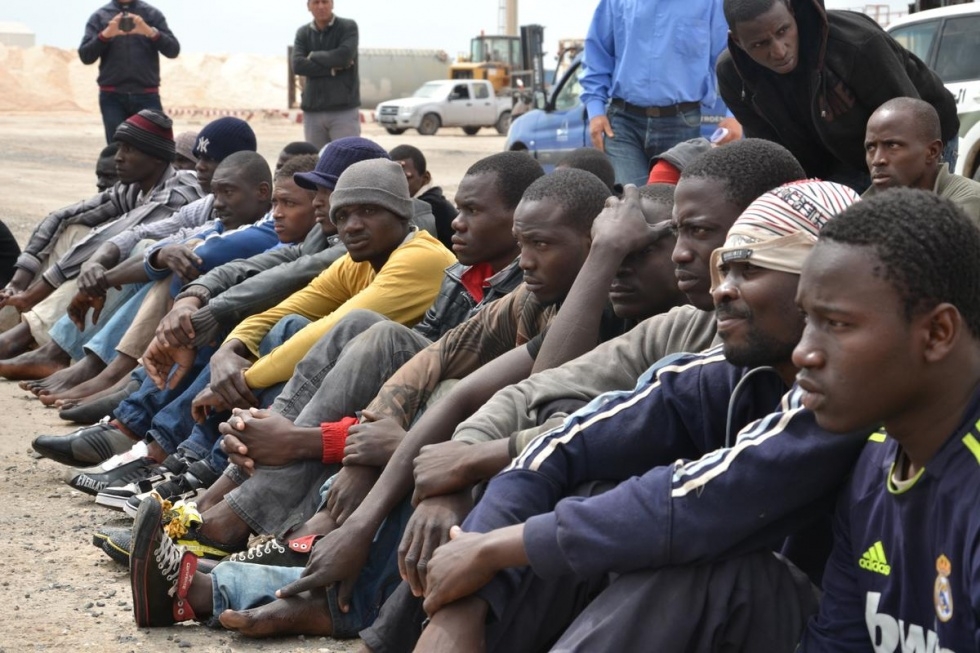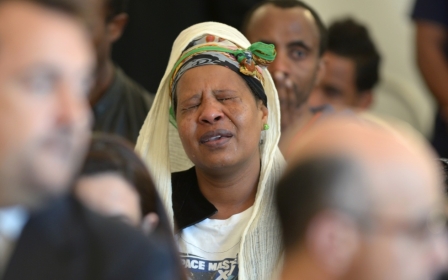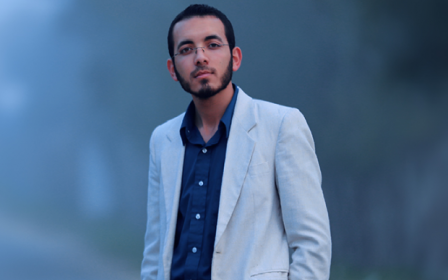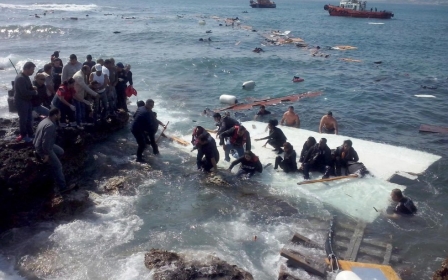The drowning sea and the EU's erasure of memory

The European Union has revealed its dictatorial schemes following the latest tragedy of around 900 migrants drowning in the Mediterranean. While the latest repercussion of colonial exploitation has reverberated internationally, European leaders have embarked upon an endorsement of dissociation to justify further military intervention - with the ultimate aim of preventing of migrants reaching the safe haven, rather than any humanitarian concern, hence the emphasis upon human trafficking.
During the course of NATO’s intervention and forced regime change in Libya, which ended with the murder of former Libyan leader Muammar Gaddafi, a common utterance heard in Malta was that the removal of Gaddafi would halt the number of migrants attempting to reach Europe. The aftermath of imperialist violence in Libya, which was spearheaded by several European nations, unleashed severe atrocities, with militias specifically targeting Africans who remained burdened with the “mercenary” tag attributed to them by mainstream media.
The unfolding tragedies of migrants’ deaths is another phenomenon of how mainstream media, as well as the US and the EU, continue to foment distorted narratives that ultimately enable governments to create more victims away from the scrutiny surrounding the Mediterranean. If migrants are murdered in Libya, or stranded in the desert on Libya’s borders, European leaders would not have to deal with evidence in the Mediterranean that brings their heinous crimes closer to home.
The NATO coalition that embarked upon creating a failed state out of Libya, and other countries that supported the intervention and offered diplomatic engagement such as Malta, have clearly adopted the convenient practice of erasing memory and discussing the tragedy as purely an issue of human trafficking, divested of political ramifications.
There will probably be no opposition to the hypocritical scheme - after all, despite its role in destroying Libya, the EU was awarded the Nobel Peace Prize in 2012 “for over six decades [having ] contributed to the advancement of peace and reconciliation, democracy and human rights in Europe”. It is also worth noting the exclusive parameters upon which the prize - which has been awarded to several human rights violators such as US President Barack Obama - has been given to the EU.
During a meeting in Rome, Italian Prime Minister Matteo Renzi and Maltese Prime Minister Joseph Muscat continued with the nonsensical rhetoric bequeathing the EU with impunity. Exhibiting an intent to increase detached propaganda, Renzi stated: “We are facing a serious humanitarian crisis that requires a solid response from the international community. We are facing a new slave trade and new slave traders. We are going back in time when people made money from human life. That is what is happening now in North Africa.”
EU's rhetoric of impunity
Muscat gave an example of his usual hyperbole. “We need to secure Libya’s borders and break the back of the criminal network.” While insisting he was not advocating an invasion of Libya or a peacekeeping mission, Muscat stated: “We are talking about direct interventions to target these networks.”
The defunct Operation Mare Nostrum which was established in October 2013 by the Italian government, has been credited with the saving of thousands of migrants’ lives. Yet, the statistics provide the means of obscuring the reality of such programmes. A look at the wider framework reveals a cycle of colonial ramifications and foreign intervention that necessitate additional military schemes as a remedy. While not disputing statistics, the humanitarian veneer attributed to Mare Nostrum only serves to highlight the EU’s hypocritical and selective criteria when it comes to the parody of participating in destroying countries and later attempting to salvage some semblance of reputation by saving a meagre fraction of lives.
The Draft European Council Statement published on StateWatch provides an insight into the military cycle that has characterised humanitarian aid and collaboration with institutions such as the UN, which approved NATO intervention in Libya. In its introduction, the prelude to the increased number of migrants’ deaths is eliminated. Instead, the EU “will actively support all UN-led efforts towards re-establishing government authority in Libya”.
Such a statement reveals how the EU has simplified both NATO intervention and the problems faced by migrants. The EU has proposed strengthening of its presence at sea, fighting traffickers, preventing “illegal migration” flows, and reinforcing internal solidarity. As usual, the burden of illegality is placed upon migrants who are exercising their right to seek asylum, as opposed to Europe’s culpability in exacerbating the migrants’ plight by bombing Libya and setting the scene for a prevailing failed state that unleashes extreme violence daily.
Clearing the crime scene
The programme, which also includes repatriation, provides the EU with a framework that attempts to clear the Mediterranean from scrutiny. However, it fails to address, and indeed upholds, the chaos created by NATO and the UN. Primarily, the targeting of traffickers as a network divested of political connections simplifies the complex links between foreign intervention and increased migration as a consequence of the violent aftermath approved by international institutions.
Secondly, it validates the choice of NATO intervention in Libya and steers away from admitting that migrants are facing additional hardships as a result of the regime change agenda. Despite the evidence coming out of the country, the UN has still not declared Libya a failed state, preferring instead to continue futile dialogue with representatives and militias who, together with NATO, are responsible for the country’s decline.
Securing the Mediterranean through further military intervention and surveillance - the latter a contribution by Britain, which intends to send drones as part of the search and rescue operations - is unlikely to stop traffickers. Rather, different trajectories will be utilised, creating a scenario where the same people remain exploited, while responsibility is conveniently shifted to others depending upon the new routes and destinations.
It is the latter that that should be construed as evidence of Europe’s hypocrisy. Combating human trafficking has become the latest euphemism for collective impunity. The aim is, ultimately, to reclaim the Mediterranean as a sea devoid of evidence pointing to Europe’s collaboration in endorsing and maintaining violence.
After all, the humanitarian issue has long been rendered redundant. Migrants drowning close to Europe’s shores are an evident blemish upon the region. Conversely, forcing traffickers to change routes, bringing about a situation where migrants are murdered in Libya, or else stranded in the desert after repatriation will bolster the EU’s alleged credibility. After all, the stench of the blood of migrants incarcerated in other territories through the EU’s military policies will not infiltrate the fortress it is so keen on preserving.
- Ramona Wadi is an independent researcher, freelance journalist, book reviewer and blogger specialising in the struggle for memory in Chile and Palestine.
The views expressed in this article belong to the author and do not necessarily reflect the editorial policy of Middle East Eye.
Photo: African migrants, who wanted to go to European countries, are seen at the port of Zarsis near Tataouine, Tunis on April 25, 2015 after being rescued by the Tunisian fishermen. (AA)
New MEE newsletter: Jerusalem Dispatch
Sign up to get the latest insights and analysis on Israel-Palestine, alongside Turkey Unpacked and other MEE newsletters
Middle East Eye delivers independent and unrivalled coverage and analysis of the Middle East, North Africa and beyond. To learn more about republishing this content and the associated fees, please fill out this form. More about MEE can be found here.





